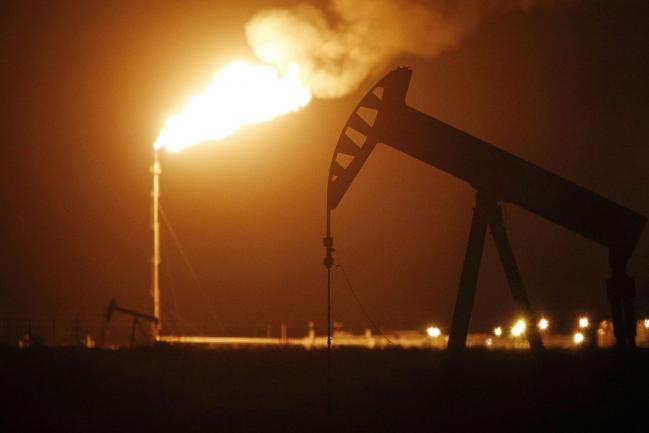(Bloomberg) -- Gold held losses while oil gained as tight races in key battleground states in the U.S. election left investors scrambling to parse the shifting odds in a fraught battle for the presidency.
The unresolved outcome -- due to an unusually large number of mail-in ballots because of the coronavirus -- spurred the market to reassess the potential scale and timing of a much-needed U.S. fiscal stimulus package, the trajectory of the dollar and appetite for risk. On Wednesday afternoon, Democrat Joe Biden won Wisconsin, according to the Associated Press, while CNN and NBC projected the democratic nominee beat President Donald Trump in Michigan, offering him a clearer path to victory.
Gold and copper experienced wild rides in response to movement in the dollar, with bullion swinging between a gain of 0.4% and a loss of 1.4%. Oil surged as much as 4.2% to over $39 a barrel after fluctuating in a roughly $2-a-barrel range for much of the session.
“Moving effects on the dollar from the election headlines really dictate the movement” in commodities, said Janet Mirasola, managing director at Sucden Futures. “I think no one has a clue.”
With millions of ballots still to be counted, Trump falsely declared early Wednesday he had won re-election and said he would ask the Supreme Court to intervene. Meanwhile, Biden’s campaign said he was on track to be next president of the U.S.
Click here for our real-time news updates and analysis
The results so far -- with Democrats facing a narrower majority in the House and long odds for taking the Senate -- point to a smaller Covid-19 relief bill than the roughly $2 trillion that had been discussed by the Trump administration and congressional Democrats before the Nov. 3 election. With a potential “blue wave” off the table, bond traders are pricing in less fiscal support, sending yields reeling.
“From a positioning flow point of view, all the action right now is in the bond market,” Paul Wong, a market strategist at Sprott Asset Management LP, said by phone. “Gold backing off to me is more of a lack-of-interest type of trade than being bearish. Frankly people probably just have bigger fish to fry.”
Delays to any conclusive outcome during the next few days should keep commodity-market volatility elevated as investors wait for more clarity, said Darius Tabatabai, head of trading at Arion Investment Management Ltd.
“It’s just illiquidity breeding illiquidity and I really don’t think that will come back properly until the political situation is resolved,” he said. “It’s hard to take a long-term view on something that will grind on and on.”
The stakes have never been higher in a U.S. presidential election. Whoever wins will have the monumental task of leading the nation in its fight against the coronavirus, which has claimed more than 230,000 lives in the country and decimated the economy. On a global level, the next president will also play an integral role in shaping domestic as well as international efforts against climate change, the use of fossil fuels and the pace of energy transition.
Crude futures extended gains after a U.S. government report showed domestic supplies falling by 8 million barrels last week and distillate inventories also declining. Still, a gauge of gasoline demand was down 11% from a year earlier.
“We can say with a high level of confidence that we’re not getting a massive Blue Wave here,” said Bart Melek, head of global commodity strategy at TD Securities. In the event of a split Congress, “the status quo essentially means demand improves with the economy because there won’t be any policies to actively dissuade the population and the industry from using hydrocarbons.”
A Trump win would be “bullish for oil, as OPEC+ can keep cutting without fear that Iranian oil supply will come back into the market any time soon,” said Bjarne Schieldrop, chief commodities analyst at SEB AB.
See also: Crude Oil Looking to OPEC+ Move More Than Vote Counts
In the copper market, investors will be looking for clues on the likely path of trade relations between China and the U.S. over the next presidential term, according to Luke Sadrian, chief investment officer at Commodities World Capital LLP.
“For copper specifically, the future relationship with China will be massively important,” he said by phone. “My advice would be to sit and wait to see who wins the election, and don’t try to get ahead of it, because everything is so diametrically opposed.”
Soybean futures posted the best day in a month amid signs that strong Chinese buying could last into 2021 and investor concerns of lingering dryness in key South American producers.
“Southern areas of Brazil have been very dry, as has northern Argentina, and Uruguay and Paraguay, and in that area we could lose some yield,” Jack Scoville, vice president at Price Futures Group in Chicago, said by phone. “That’s something to be watched especially with La Nina.”
©2020 Bloomberg L.P.
